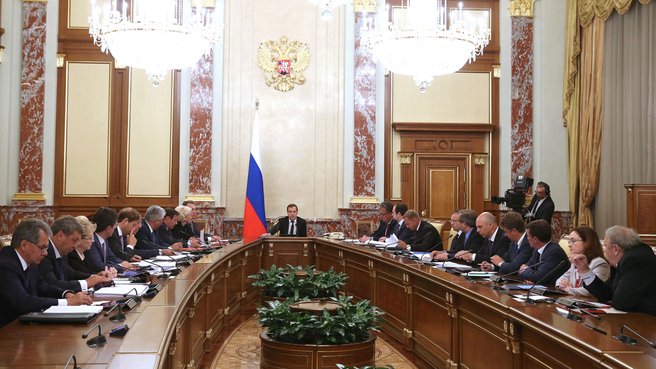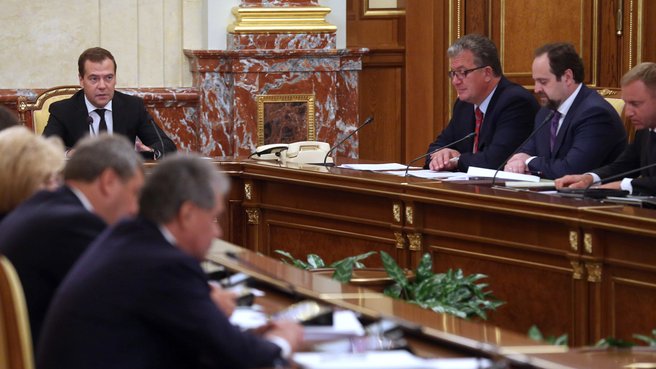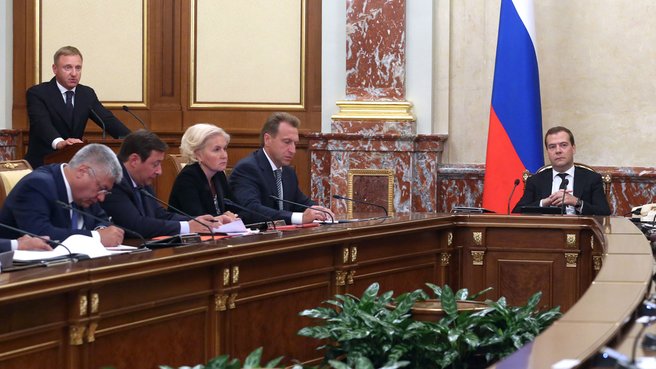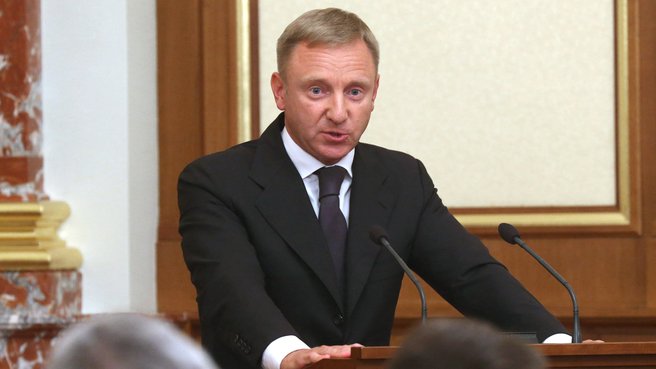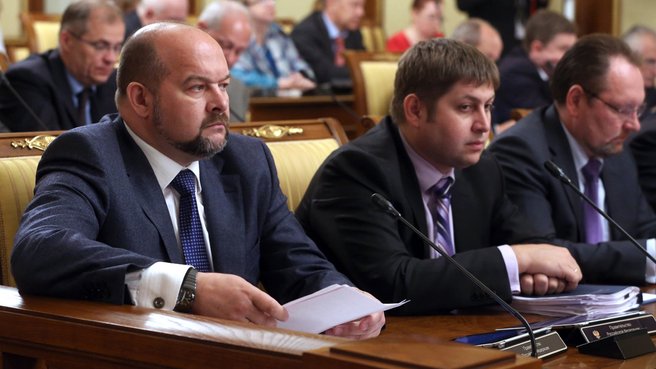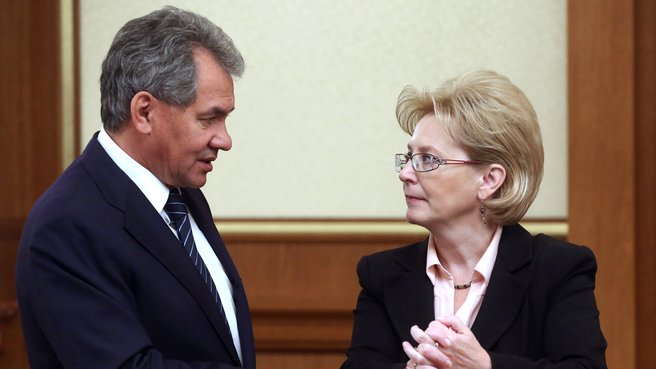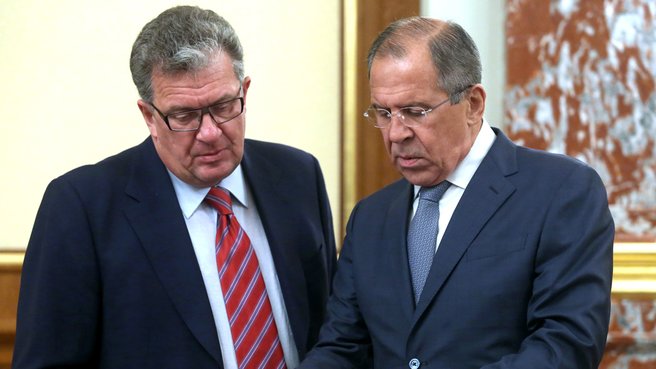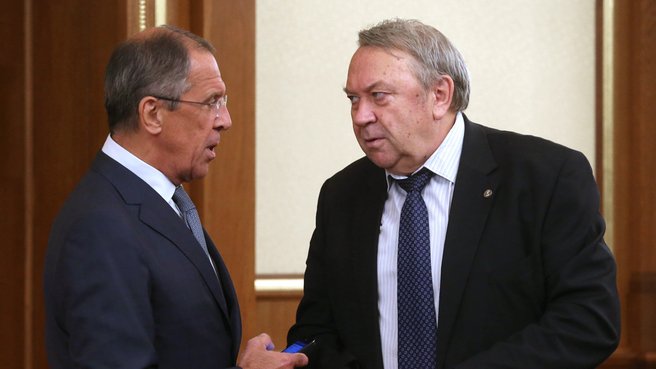Agenda: Support for higher education institutions that play a key role in the regions’ socio-economic development, and 12 other issues.
Contents:
Dmitry Medvedev’s opening address
The speech of the Governor of the Arkhangelsk region Igor Orlov
Transcript:
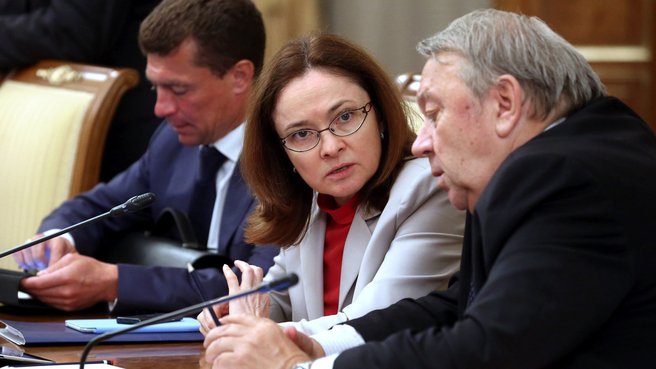
Minister of Labour and Social Security Maxim Topilin, Central Bank chairman Elvira Nabiullina and President of the Russian Academy of Sciences Vladimir Fortov
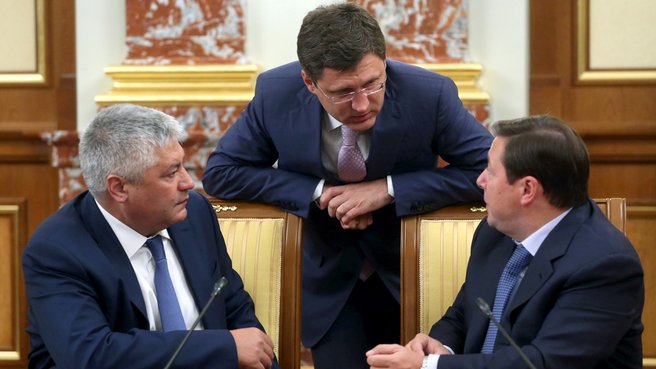
Minister of the Interior Vladimir Kolokoltsev, Minister of Energy Alexander Novak and Presidential Plenipotentiary Envoy to the North Caucasus Federal District Alexander Khloponin
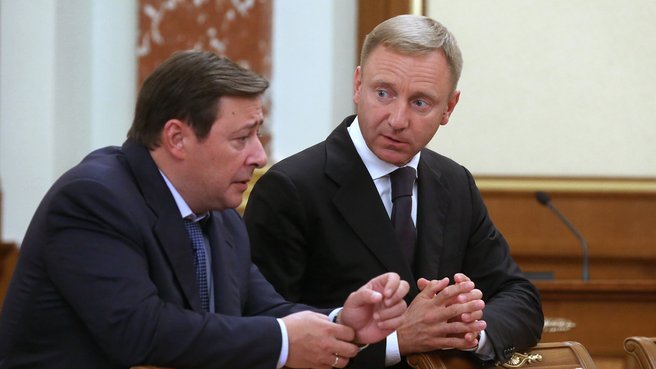
Presidential Plenipotentiary Envoy to the North Caucasus Federal District Alexander Khloponin and Minister of Education and Science Dmitry Livanov
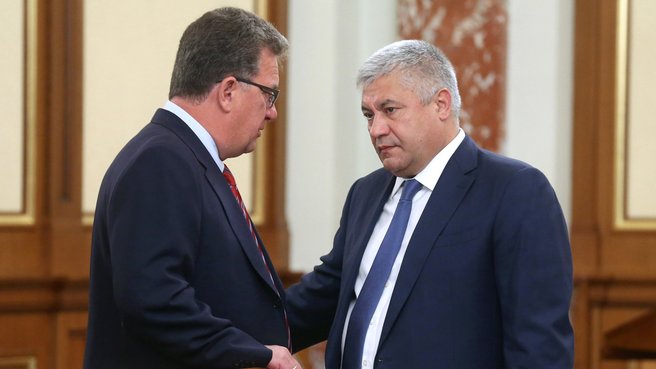
Deputy Prime Minister and Chief of the Government Staff Sergei Prikhodko and Minister of the Interior Vladimir Kolokoltsev
Government meeting
Dmitry Medvedev: There are not so few of us as one might imagine. I’d like to welcome the participants in the meeting. We are meeting in August. The new academic year will start soon and today we have several issues regarding education on our agenda. But before we start discussing them I’d like to say that I’ve signed a Government resolution on creating a special database that will contain the results of inspections of educational institutions. It will allow us to realistically evaluate their performance according to uniform standards and to improve the teaching process by making it more intensive and professional.
Now I’d like to say a few words about our agenda. The first issue concerns higher educational institutions that play a key role in the development of our regions. Obviously, they should educate specialists that are in high demand, consider the labour potential of the regions where they are located and take into account proposals of federal agencies and, most importantly, the business community.
However, the real picture is very different. The regions that are developing aircraft manufacturing or metallurgy need engineers and designers, but there are mostly economists and lawyers in the market, as everywhere else. As a result, modern high-tech enterprises are short of qualified personnel and graduates cannot find jobs in their specialty. Recently, at the youth forum in Pyatigorsk several days ago I spoke about the fates of universities whose graduates are not needed in the labour market at all. What to do about them? A major role is played by the regions where universities have existed for a long time and become part and parcel of life. I’m referring to the Novosibirsk Region, the Primorye Territory, Moscow and St Petersburg, to name a few.
D.Medvedev: "We’d like to make Russian universities more competitive and to see at least five of them among the top hundred of global education centres. <...> The budget has allocated a generous 42.5 billion roubles to this end for the next four years."
We believe it is necessary to support those educational institutions that are directly involved with industrial enterprises – that is, employers – and are making a concerted effort to develop innovation products. Their graduates – preferably long before completing their studies – know they will work where they live and study and will get an interesting and well-paid job. It is necessary to provide the biggest number of state-subsidised places for these educational institutions; to select educational and R&D projects on a competitive basis; provide government aid and encourage businesses to fund them. This is a good guide that allows the business community to decide where to launch new production lines. It also helps the regions to develop their innovation and technological capacity. Let’s speak about this issue.
Another issue deals with support for our leading universities. We’d like to make Russian universities more competitive and to see at least five of them among the top hundred of global education centres. A modern university should participate in the formation of world educational standards and play an active role in international cooperation. This is an ambitious goal, but we must achieve it. At the end of the past year, we approved a package of measures to this end and selected the 15 best universities that will receive state support – about 600 million roubles or a bit less.
We summed up the results of the contest at a meeting of the council on enhancing competitiveness. It was won by three federal and 11 national research universities and one university that is carrying out a programme of special strategic development. Now we should monitor how effectively they are using the allocated funds while implementing their roadmaps.
We’ll hold such contests every year and other universities will have a chance to compete. The budget has allocated a generous 42.5 billion roubles to this end for the next four years. In addition, we’ll discuss another very important issue – the distribution of funds to the regions that are implementing mortgage programmes for young teachers (under 35 years).
These funds will be used for down payments. Young teachers will be granted loans with an interest rate of 8.5%, far below the market rate.
I consider these programmes to be very important. It is a common task of the federation, the regions and our entire country to create normal housing conditions for our young teachers.
One more issue is the distribution of subsidies granted to small and medium-sized companies, including farms and households. The Government is paying special attention to this issue. It will grant 18 billion roubles of subsidies to 82 regions. The share of co-financing of regional programmes from the federal budget amounts to about 70% on average.
I’ve also signed a directive on the investment climate. I’m referring to roadmaps that involve experts and entrepreneurs in the areas that pose the biggest problems for business. We have determined which federal agency will be responsible for the implementation of each of these roadmaps. The tasks are set and we know who is in charge, so now they must work to produce results.
D.Medvedev: "We’ll discuss another very important issue – the distribution of funds to the regions that are implementing mortgage programmes for young teachers (under 35 years). These funds will be used for down payments. Young teachers will be granted loans with an interest rate of 8.5%, far below the market rate."
Finally, I’d like to mention that we continue our important and complicated work on the budget. We are discussing it for the next three years, talking about future issues and assessing expert positions. There are several major decisions that have not been made yet. They are at the centre of the public’s attention, but the Government has not discussed them yet.
I’ve taken a look – the debates over maternity capital have been heated. They are being held as if all decisions have been taken long ago. Let me remind everyone that maternity capital was established in 2006 and has been very useful in improving the demographic situation in this country. By law it will be provided until 2016. This is simply a legal statute but we haven’t yet decided what to do next. We should discuss this with the public and the expert community. Let’s discuss this and not only today. I just want to emphasise that expert discussions do not constitute a Government decision.
Let’s move on to our agenda and discuss support for universities that are playing a key role in their regions, as I’ve already mentioned. Mr Livanov, please take the floor.
Dmitry Livanov: Mr Medvedev, colleagues, staffing is certainly a key prerequisite for modernising and ensuring the innovation-based growth of the economy. Industrial enterprises, social organisations, and service businesses throughout Russia need young specialists with advanced knowledge who are able to apply their knowledge in practice, and are self-motivated and goal-oriented. To date, the capabilities of higher education institutions are often out of sync with the needs of the economy, the social sphere, and the labour market. There is a structural mismatch: regions need specialists with particular skill sets, but local universities don’t provide them. A case in point: a particular region is home to mechanical engineering and metal working plants and needs engineers and process managers. Meanwhile, the regional labour market offers people degrees as economists, managers, or lawyers who can’t get a job in their respective fields. As a result, the real sector experiences shortages of skilled personnel. To correct these imbalances, we need to provide targeted support to higher education institutions, not only (and even not so much) financial support. In accordance with presidential executive orders and directives, and the federal law On Education in the Russian Federation, and based on the government and federal programmes, we have put together proposals to support higher education institutions which play a key socioeconomic role in respective regions.
Some of these proposals are already being implemented, while others will be carried out in the near future. First and foremost, the issue is about introducing innovative and effective relations between higher education institutions and businesses, innovative principles underlying the allocation of admission quotas for higher professional education programme and implementing programmes to promote higher education institution for the benefit of specific regions. We have developed and submitted for approval by the Government more than 10 regulations providing a legal framework for effective cooperation between educational institutions and the real economy, which will stimulate interaction between higher education institutions and employers. The key principle is about joining efforts and integrating approaches when higher schools and businesses are engaged in the education process and form partnerships. There are different forms of such integration: ones with proven track records and new ones. I will give you some of them that are included in the new law On Education in the Russian Federation which comes into effect on September 1.
First, the creation of basic departments offering practical training at enterprises. Students of such departments study to master specific production processes. In the Soviet Union, the creation of basic departments at leading universities was common practice, but this tradition has been largely lost. Since 2000, Russia has created just a few dozen basic departments, mainly at research institutes, which is obviously not enough. Great opportunities offered by interaction with industrial enterprises are thus squandered. Notably, previously basic departments were opened mainly at research institutes, but now they will be created in the first place at enterprises of the real sector of the economy.
Second, network-based relations between universities and businesses, including joint educational programmes based on innovative knowledge transfer and practical skill development processes. There are many examples of networking between universities and other educational or research institutions, but practical instances of networking with the real sector of the economy are few and far between. We are aware of the relations between Rosatom and 15 higher education institutions led by MIFI National Research Nuclear University that trains nuclear industry personnel. We have recently signed an agreement with Roscosmos to create a consortium of 38 higher schools and 16 major space companies.
Third, a new understanding of targeted learning that is enshrined in the new law on education. It will still be paid for from the federal budget, but the relationship between students and employers will change. Previously, there were no legally binding commitments between employer and student. With the new system of targeted admissions in place, the student will sign a contract with the employer which will clearly outline the responsibilities of the parties. If, upon graduation, a student changes his mind and decides not to go to work at this particular company, then, in accordance with the terms of this contract, he will have to reimburse the employer for the cost of his education, such as social benefits, scholarship and so on, and to pay a penalty in the amount of up to 200% of these support funds.
D.Livanov: "In 2013, we introduced a new system for allocating admissions quotas for the higher education programme. For the first time, we managed to effectively take regional needs for training into account. The underlying principle here is that if certain sectors, such as transport, communications, culture, medicine, or agriculture, enjoy a priority status in a region, then higher schools that train workers for these industries should receive state-financed student places in amounts that will meet the demand. They and major employers in their respective regions were based on regional forecasts for staffing needs."
Four is the introduction of hands-on higher education programmes, also know as an applied baccalaureate. Beginning this school year, we have identified a list of undergraduate training areas that will include not only academic but also applied skills. This will help us to meet the demand for skilled workers who can operate high-tech equipment.
The applied baccalaureate is not just about technical specialties, since highly-skilled employees are needed in all industries. For example, the Altai State University has five applied baccalaureate programmes, including the liberal arts. The Urals Federal University has adopted a regional standard to design and implement applied baccalaureate programmes in engineering and production processes. A graduate of such a programme, a process manager, will be able to work at a plant as a production floor manager or a team leader. The university is developing the programme based on this standard along with the Urals Mining and Metallurgical Company. The academic process takes place at the university and the production facilities operated by this company. In the upcoming school year, 5% of the students will train in accordance with this arrangement. The applied baccalaureate programme will be implemented at 44 higher education institutions and 60 fields of study. This percentage will grow exponentially in the future. Our goal is to provide regulatory support and methodological guidelines to ensure effective relations between higher education institutions and regional enterprises. We would like not only higher schools but businesses to step up their work in addressing these challenges. Training is a matter of shared responsibility.
In 2013, we introduced a new system for allocating admissions quotas for the higher education programme. For the first time, we managed to effectively take regional needs for training into account. The underlying principle here is that if certain sectors, such as transport, communications, culture, medicine, or agriculture, enjoy a priority status in a region, then higher schools that train workers for these industries should receive state-financed student places in amounts that will meet the demand. The admissions quota allocation procedure includes not only federal executive bodies, or federal association of employers, but regional executive authorities as well. They and major employers in their respective regions were based on regional forecasts for staffing needs. This makes sense, since locals have a better understanding of which specialists they need. For the first time, regions now can influence the decisions regarding the allocation of state-financed student places in universities located on their respective territories.
The admissions quotas were for first time split into a federal portion which is allocated in an open auction among Russian universities and a regional portion which may be claimed by universities and their branches located in a particular region.
In 2012 (I want to point this out), we allocated 491,000 state-financed student places. In 2013, this figure remained unchanged. Thus, the availability of free higher education for our students has not diminished, but important changes took place in 2013. We have increased admissions quotas for engineering and technical specialties by over 5%; natural science by 3%; and medical studies by 6%. The admissions quotas for engineering and technical majors increased in 49 regions; natural science in 51 regions; medical studies in 63 regions; and education and teacher training in 59 regions.
For example, there was a 34% increase in admissions quotas at higher schools in the Vladimir Region that train students in metallurgy and metal processing. This increase is due to a request by key regional companies, including the Vladimir Motor and Tractor Plant and the Kirov Mechanical Plant, to name a few. The Krasnodar Region, which specialises in the hospitality industry, saw a 31% increase in admissions to schools training workers for the hospitality and tourism industry. Admissions to state-financed programmes at higher education institutions in the Ryazan Region increased by 43% in educational programmes related to instrument-making, because companies located in this and neighbouring regions need such specialists.
Of course, there are instances where admissions quotas were cut. For example, they are down 5% in Moscow and 2% in St Petersburg. The number of student places for teacher-training specialties went down in the Novgorod, Orenburg and Smolensk regions. In the Samara Region, admissions quotas for natural sciences are down, too. There was a slight decrease in the number of student places in the regions with underperforming higher schools, such as the Tula and the Kostroma regions. Draft admissions quotas for 2014 were sent out to the regions, so that they can make adjustments regarding the overall admissions quotas and the ratio between the regional and federal portions based on their needs.
D.Livanov: "We have increased admissions quotas for engineering and technical specialties by over 5%; natural science by 3%; and medical studies by 6%. The admissions quotas for engineering and technical majors increased in 49 regions; natural science in 51 regions; medical studies in 63 regions; and education and teacher training in 59 regions."
We have formed a network of leading higher education institutions over the past eight years, including Moscow University, St Petersburg State University, nine federal universities, 29 national research universities and 55 other higher schools that won federal funds for their strategic development programmes on a competitive basis. Most of the leading higher schools play a special socioeconomic role in their respective regions and federal districts. These universities outpace their competitors in terms of R&D. In 2012, the amount of these activities grew by over 20%. They are very active in promoting innovation-based corporate development programmes and creating innovation-driven small businesses.
All leading universities’ development programmes receive state funding. As you said, Mr Medvedev, 15 of them won a contest among universities that are aiming to make it onto the list of the top 100 universities in the world. I will speak about this programme when we get to the second item on our agenda. We will launch a development programme for all leading Russian universities before the end of the year. It will be based on the economic priorities in the universities’ home regions and federal districts. We don’t ignore minor universities. However obscure they might be, they train good industrial specialists for their regions. With their focus on regional economic priorities, such universities certainly have the right to government aid. It is especially important to the 30 regions that still don’t have a single university with a state-funded development programme.
To address the problem, we launched the Workers for Regions public competition, which we will soon summarise. It promotes higher education that will train workers for priority industries. The programme will support universities that are drafting new economically relevant curricula together with their regions’ main companies. Contest winners will receive grants up to 50 million roubles a year if industrial companies co-fund the venture. We will select a hundred or more universities this year to compete, and the next contest stages will begin next year.
We call on federal executive bodies with subordinate universities to arrange similar competitions between them for extra grants. Such programmes will help young people find jobs in their field, and increase universities’ extrabudgetary revenue from contract work.
We have coordinated these initiatives and proposals with the relevant federal executive bodies, particularly the Ministries of Economic Development, Regional Development, Development of the Russian Far East, Healthcare, Transport, Agriculture, Culture and Sport. Please support the measures planned and carried out by the Ministry of Education and Science to help universities that play a key role in regions’ social and economic development.
Thank you.
Dmitry Medvedev: Thank you. Could you speak on the next item right now?
Dmitry Livanov: I am ready.
Dmitry Medvedev: I would like to ask your advice, colleagues. Should we ask the speaker not to leave the rostrum? He is saying interesting things. Please go on, Mr Livanov.
Dmitry Livanov: Ladies and gentlemen, the President set us a task in May 2012: no less than five Russian universities must join the top hundred in the world by 2020. To achieve this breakthrough in the competitiveness of leading Russian universities, the Government launched a project under the working title of “5-100”. A competition was launched early last May to provide state support to leading universities to make them more competitive among world education and science centres. Winning universities were announced early in July. There were only 54 applications for the open competition from seven federal districts and 25 regions, though any university could compete. All winners are among the leading universities that are implementing state-supported development programmes. So only those who had started the work already competed. Moscow and St Petersburg universities did not participate due to their exceptional legal status, which entitles them to state support for their development programmes.
Universities were selected for competition by the Council for Promoting the Competitiveness of Russia’s Leading Universities among the World’s Leading Research and Education Centres. Half of its members are prominent international experts on higher education, influential professors, and rectors of the world’s foremost universities. The council meeting of July 5-6, attended by the Prime Minister, discussed competitiveness programmes submitted by the rectors of 36 universities selected to compete. The council analysed every university’s current efficiency, its current capabilities, and to what extent and how quickly it can be expected to build up those capabilities. The rectors had never before made public presentations of their development programmes.
As the result, the council made recommendations within its duties for the Ministry of Education and Science concerning the 15 winning universities and the formula to calculate their grants. The council also advised distributing this year’s grants smoothly and with consideration for the rules of state subsidy granting and distribution, which the federal government has endorsed. In this connection, I ask you to approve the Government resolution drawn by the Ministry of Education and Science concerning university grant distribution to make them more competitive among the world’s leading research and education centres.
We should also notice that the winning universities have gained considerable international recognition for their achievements, made spectacular progress in research, and use excellent educational technique.
As we discuss the idea of Russian universities receiving high international ratings, many doubt that Russia needs them at all. But we assume that leading universities working to the highest world standards are part of world leader status, and matter just as much as space exploration, or artistic and cultural achievements. They show a nation’s competitiveness. Universities produce new knowledge and form the nation’s intellectual elite. We certainly realise that to be included on the world top 100 list is not a goal in itself but a measuring stick – though not 100% objective – to compare the achievements of Russia and its universities with other nations. On the other hand, it signals to the public that these universities have the highest concentration of the best researchers while providing a quality education, so they are attractive to students and professors. They do not merely meet world standards, they set them.
The winning universities must step up research, update curricula, improve their personnel even faster than their plans envisage; they must reform administration, and do many other things. All of this demands putting an end to inefficient methods, and reappraising the mission and strategy of university development.
Special attention must be given to research because world standards demand that universities do more than educate but that they generate new knowledge and pioneering technology. An overwhelming majority of Russian universities don’t qualify in this respect despite the impressive improvement of their equipment in recent years. Our project will change things for the better; it will promote university research.
By October 15 the winning universities will present their schedules for implementing their programmes to become more competitive. The council will discuss these roadmaps at its meeting on October 25-26. We will monitor the implementation following the university reports. We envisage a university rotation – the grants will shift from the ones that don’t compete.
Please pay attention to…
Dmitry Medvedev: Will the universities that lose grants have to pay them back?
Dmitry Livanov: They will hardly be able to afford that. In any case, those universities will not receive state support later.
Dmitry Medvedev: I see.
Dmitry Livanov: Please note that many countries have been engaged in similar national initiatives over the last 20 years. China, Japan, Canada, France, Germany, Norway, Finland, Singapore, Denmark and other countries spend considerable funds to support leading universities. China has spent a sum equivalent to 450 billion roubles or even more since 2000, and Germany 170 billion roubles in seven years. France allocates roughly 10 billion roubles a year – comparable to the amounts we have specified.
Project “5-100” will promote not only the modernisation of higher education and research, it also promises to promote science, increase cooperation with other world research centres, make researchers more mobile, engage the best professors and students in research, and spread project achievements nationwide. Thank you.
Dmitry Medvedev: Thank you, Mr Livanov.
I think that, before we begin our discussion, we should give the floor to those who want to speak up on the first part of this report, which concerned universities playing a key part in regional development.
One of our colleagues attending here, Arkhangelsk Region Governor Igor Orlov, could brief us, too. Go ahead, please.
Igor Orlov: Thank you very much. Mr Medvedev and Government members, there are two major universities in the Arkhangelsk Region. First of all, there is the Mikhail Lomonosov Northern (Arctic) Federal University and the Northern State Medical University. The Arkhangelsk Region Government is continuously building the system of relations with them primarily in the area of training and retraining professional personnel, and conducting research and developing innovative technology under the orders from the Arkhangelsk Region Government and regional economic entities.
In May 2011, the Arkhangelsk Region adopted a special regional law on state support for the Northern (Arctic) Federal University developed by the regional Government. This law establishes the legal foundation for regional support for an academic institution.
In 2012, the regional Government and the university concluded an agreement on cooperation in personnel training and research. When cooperating in personnel training, we are based on the fact that the Northern (Arctic) Federal University is the basic centre of the overall regional educational system. Given this fact, we develop specific steps to include our regional research policy in the activities of the federal authorities on reforming and updating education, in particular, professional education and training.
The Northern (Arctic) Federal University educates specialists with a higher and secondary vocational education, practically for all economic sectors and the social sphere of the region. Meanwhile, the exploration of the Arctic will need a clear orientation of the personnel training system to meet the economic demand in the case of major projects in the Arctic. We conduct such work in the Akhangelsk Region. Last year, as part of our cooperation with the United Shipbuilding Corporation, we created a special Institute of Shipbuilding and Maritime Arctic Engineering. The Northern (Arctic) Federal University continues to train teachers and develop classic areas; the university is a major academic institution educating teachers for preschools, secondary schools, and professional schools in the region. Simultaneously, the federal university is currently an experimental platform for the Russian regions for implementing projects in the area of school extra-curricular inclusive education.
The university has a social orientation because over 50% of students are graduates of rural schools in far-off districts, including students who are enrolled with targeted referrals. The university actively participates in regional employment programmes and is a major employer in the region.
In 2013, the university jointly with the Akhangelsk Region Government, based on the Skolkovo Moscow School of Management, conducted an integrated educational programme, the Akhangelsk Region Development Prospects: Development Strategies and Resources. The programme included the participation of university researchers and the officials of the Akhangelsk Region executive bodies.
In addition, the university is implementing the innovative research potential for updating regional industrial and social development. Already today the university is exerting practical influence on a number of economic sectors and participates in the implementation of major strategic projects. Regarding the development of industrial projects on the continental shelf, the university implements cooperation programmes with resource corporations. Supported by the regional Government, the university actively concludes agreements with state and private corporations. In addition, the regional Government annually co-finances about 30 research projects on priority research areas of the Akhangelsk Region according to the regional development strategy. When building its research and personnel policy, the Akhangelsk Region Government accentuates young people, and extends special research grants to graduate students, DScs, PhD students and students. The regional government jointly with the university is implementing some specific programmes as part of the state policy in the area of fitness and sports and improving the efficient state youth policy. For example, the university experts have participated in the development of the state programme on patriotic education, fitness and sports, youth policy and tourism. The university scientists provide for research and methodical support for the project of the All-Russian Fitness and Sport Complex; leaders of university youth associations manage the federal projects of the Federal Agency for Youth Affairs in the Arkhangelsk Region.
Mr Medvedev, we support the systemic work of the Government aimed at supporting leading universities and this can be seen in the report of Minister of Education Dmitry Livanov because it is up to universities to play an extremely important role in territorial development; it is up to universities to resolve national tasks and train personnel who will be able to take part in large-scale processes working in regions. Thank you.
Dmitry Medvedev: Thank you very much.
Now, colleagues, now we can discuss this. Mr Shoigu, go ahead please.
Sergei Shoigu: I’m not asking a question, but rather contemplating. In effect, we know the number of specialists working in major foreign universities, the graduates and the people educated in Russia. This number could be compared with the number of graduates from foreign universities residing in Russia. Maybe our universities should compile their own rating of higher education establishments, of world’s universities because we are aware of the achievements of Soviet and Russian science; they are clear and understandable. We should not leave aside our national achievements and the national level of training. Perhaps we should make assessments on our own scale, too?
Dmitry Medvedev: I do not consider myself an expert. However, I think that we do not know the number of our graduates working abroad. We can only guess the number of graduates flowing to foreign countries and their professions. Those are mostly the graduates of major universities. And also those who after graduation work within the system of the Russian Academy of Sciences, and then they find their ways abroad. Regarding our own ratings, I believe that we could make some assessments. However, the standing of the international ratings system is the fact that it has been acknowledged by a considerable part of the community. There are many ratings. That is true. We can compile our own ratings, of course, but we should bear in mind that their standing will be very local.
Mr Fortov, will you go ahead?
Vladimir Fortov (President of the Russian Academy of Sciences): I want to make a little comment on the first part. I do not quite appreciate this pragmatic focus on training specialists to meet regional demand. This is not a simple question – how to train and what to train specialists for in the 21st century. The situation has changed drastically. Currently, in the course of one life, humanity produces 80% of all, new information in human history since Democritus and Ancient Greeks. Therefore, it is useless to teach factual material and make a student learn factual material. This is impossible; many scientists have written about this. Sergei Kapitsa has written about this. The solution is this that experts should have a certain level to be able to work in the market environment; and in the situation when everything is rapidly changing, we should focus on fundamental research, so that students can understand fundamental laws and be able to apply them to the rapidly changing current situation.
Vladimir Fortov: "Currently, in the course of one life, humanity produces 80% of all, new information in human history since Democritus and Ancient Greeks. Therefore, it is useless to teach factual material and make a student learn factual material. This is impossible; many scientists have written about this."
I will cite an example. When I was a student, they taught us vacuum tubes. You all remember that all TV-sets, all amplifiers, mixing circuits and so on had tubes. To date, there are no tubes at all except in special equipment. However, at the Moscow Institute of Physics and Technology, they taught us wave mechanics well; they taught us electrodynamics well and so on. When semiconductors came, it was an easy and natural thing for us. Should they not have taught us fundamental sciences, equations of mathematical physics, everything concerned with the fundamental science, we would not have been able to embrace a new thing. Because there is such a criterion of successful education: how much time it takes for a graduate to master an absolutely new profession. I remember such figures approximately: say, a Japanese person will need about six months and a Dutchman will need three months.
Dmitry Medvedev: What does it mean?
Vladimir Fortov: It means that he has good factual training and rapidly switches from one thing to another. We are discussing whether we should train fish culture specialists for the Far East. That’s true, we need fish in the Far East. However tomorrow, perhaps we will build an energy cluster or a high-tech there, you see? If our teachers and students have a good fundamental education, they will be able to work in the future. And if we focus on pragmatic tasks that we are currently facing (meanwhile, we all understand that in 10 years all of these tasks will be different), then we are doomed. I just want to make this point.
Dmitry Medvedev: I think that the answer is clear. It is inadmissible to stick to a pragmatic position; education should look into the future. You have cited this example with tubes. I can cite an example from my education and profession. A lawyer is not the person who knows the laws (laws tend to change); a lawyer is an individual who understands the principles of building regulatory material, the principles of building the legal system. This is true for any system of knowledge, I absolutely agree with this. On the other hand, colleagues, we should understand that our education is not pragmatic enough, not practical enough, and there are many universities producing unemployed. This is true, too. Therefore, it’s necessary to arrive at a compromise. This is the task for the Ministry, for the relevant region and for the relevant employers. I believe that this would be the right solution.
If everything is clear on the second issue concerning support for major universities, I propose to vote for two protocol decisions. Agreed? Thank you very much, colleagues.
<…>
